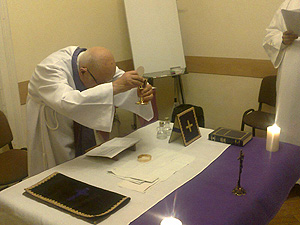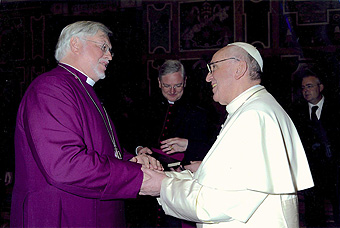Monthly services of the Polish Episcopal Network, currently held in Cracow in sw. Filipa street 23 every third Saturday of the month at 6 pm, attract still new participants. One of them, Katarzyna Zajd, who cooperates with the website Duchowość – Inny Punkt Widzenia (“Spirituality – Another Point of View”), wrote the below article inspired by last Saturday’s Eucharist in Cracow. It was a great pleasure to translate it, among other things because it reflects the goals we set for ourselves at the very beginning. You can find the original Polish text here .
That We May Be One
Every Maundy Thursday, the beginning of the Paschal Triduum, I sing together with the rest of the faithful in my beloved Dominican church in Cracow: “Father, may they all be one”. Each time these words become more meaningful to me, because they accompany me on my spiritual path – the path of knowing God revealed in people. The further I go on this path, the better I see him not only in Catholics.
I think that the problem many people of different denominations have (in this text I want to write about Christian churches) is the conviction that their denomination is the only right one. As a Catholic I have many times witnessed my brothers and sisters arguing that the Catholic Church is the best of all Christian churches. I admit that I did it too, but fortunately the need passed when I came to the rather obvious conclusion that if I were a Protestant, I would consider my native religion to be the best. Such boasting brings to my mind children in a sandbox, shouting “and my father is a policeman”, “and my father has a better car”, etc.
In “Noah’s Child”, written by my favourite author, Éric-Emmanuel Schmitt, who inspires me very much, the Catholic priest Pons says: “Religion is neither true nor false, it only offers a certain way of life”. I would add that it is the answer of the human being to God’s search for him, a voice of a restless heart, which will only find peace when it rests in God. Inspired by these words I asked myself what point is there to religious arguments and competition for being the only true one if we are united by one transcendental goal?
I look for God among people and not necessarily in my native Catholic Church. It is not difficult to be with people who think like me, when we agree with one another. I need such a community very much, because it satisfies my need to belong to a group with which I work and worship. Yet it is not enough for me. Meeting people of other denominations, representing other churches, gives me enormous satisfaction and teaches me humility and listening to another human being.
Thanks to openness to new friendships and involvement in spiritual activities also on the internet (and they say that you shouldn’t spend a lot of time there) I met Jarek Kubacki, a theologian, Anglican and pastor of an ecumenical community near Amsterdam, and Lukasz Liniewicz, an Anglican with Orthodox roots studying theology in Tilburg. They invited me to a service of Holy Communion of the Polish Episcopal Network, established under the aegis of the Episcopal Church, one of the Anglican churches. Everyone who wanted to listen to God’s Word and celebrate the presence of the Risen Lord in the sacrament of the Eucharist could take part in it. I used the opportunity, because I wanted to be spiritually united with my brothers in faith: Jarek and Łukasz, meet other people and come with them to the Lord’s Table. Jesus Christ shows no favorism, which the Gospel clearly demonstrates, why should I then argue with brothers and sisters from other churches? For what reason? Because our life stories and paths are different, even though they lead to the same God? If all people in the whole world were supposed to be uniform, God Almighty would have created them like that, he wouldn’t give them the valuable free will and the possibility to develop spiritually in manifold ways, creating their unique stories in order to become someone unique in the eyes of the Creator.
And I met such unique people: a Mariavite, the Rev. Prof. Konrad M.P. Rudnicki, who celebrated the Eucharist with great reverence, Dominik Chmielewski – a theologian with Methodist roots (even though he is a member of the Lutheran parish in Nowy Sącz as there is no Methodist church in that city) who had a wonderful sermon, and people open to dialogue. No one wanted to convert me to Anglicanism or any other denomination. To the contrary, our conversations over coffee and tea after the service were about ourselves, about who we are, what we do and what brought us here, what we share.
I couldn’t but admire Rev. Rudnicki’s humility and modesty. He has more titles than you can list, but doesn’t brag about it at all. He was incredibly kind, told many stories about his life, both sad and funny, about his love for Jesus Christ and his concern about the salvation of all people. I would like to add moreover that despite very advanced age and poor health (he was recently released from the hospital) he went up to the second floor in order to greet the people with great joy and celebrate the service. And I would like to quote his words from the interview available on Jarek and Lukasz’s blog, “Don’t Shoot the Prophet”, which explain how a Mariavite priest found himself in the Episcopal Church:
During these four years of my research stays in the United States … I served as a non-stipendiary priest in three Episcopal parishes. It was simply a need of my soul: not to stop being a priest. … I obtained a permission and a referral from my bishop in Plock and got a certificate from the bishop in charge of respective Episcopal dioceses. The Anglican Church is doctrinally comprehensive enough for me to fit in with my Mariavitism without any problem.
Yet one more thing I would like to add is that in the 80s, when Rev. Rudnicki worked in the observatory in Castel Gandolfo, His Holiness John Paul II invited him to celebrate “Mariavite” Mass in his private chapel.
It turned out that Dominik Chmielewski knows my favourite Dominican church and not only this one, which, among other things, we talked about. I did also learn something more about Lutherans since I had not known much about them before. At no moment did a need arise to compete with one another, it didn’t occur to anyone to start arguing about which church is better. I felt there as if the people who came together had their own God given potential, as if each were in their right place. So why would we want to change that?
I noticed that a problem in communication between people – also my own – is that we don’t listen to other people. Indeed, we all think that it is otherwise, that we do hear what we are told, but we listen from the position of “I KNOW BETTER”, there is always the “I” and then the rest. And this leads to many misunderstandings, sometimes even fundamentalism. If a church considers itself to be the only depository of truth, it becomes a mutual admiration society. Was this really what Jesus Christ meant that his friends (yes, we are his friends) were scattered, conflicted, started competing for the favour of their Sheppard having forgotten about the most important commandment of his, the Commandment of Love?
Regardless of what church we represent, we are the Universal Church. This is how I see the initiative of the Polish Episcopal Network, which gathers different Christians in order for them to be one. And we shouldn’t look at it as a competitor, for the point is not to strive to become “number one”. There always will be other churches, they always will be needed. It is most important that brothers and sisters in the Christian faith start listening to one another.
Father, may we all be one…







From the first word to the last, this writing is Grace. Beautiful!